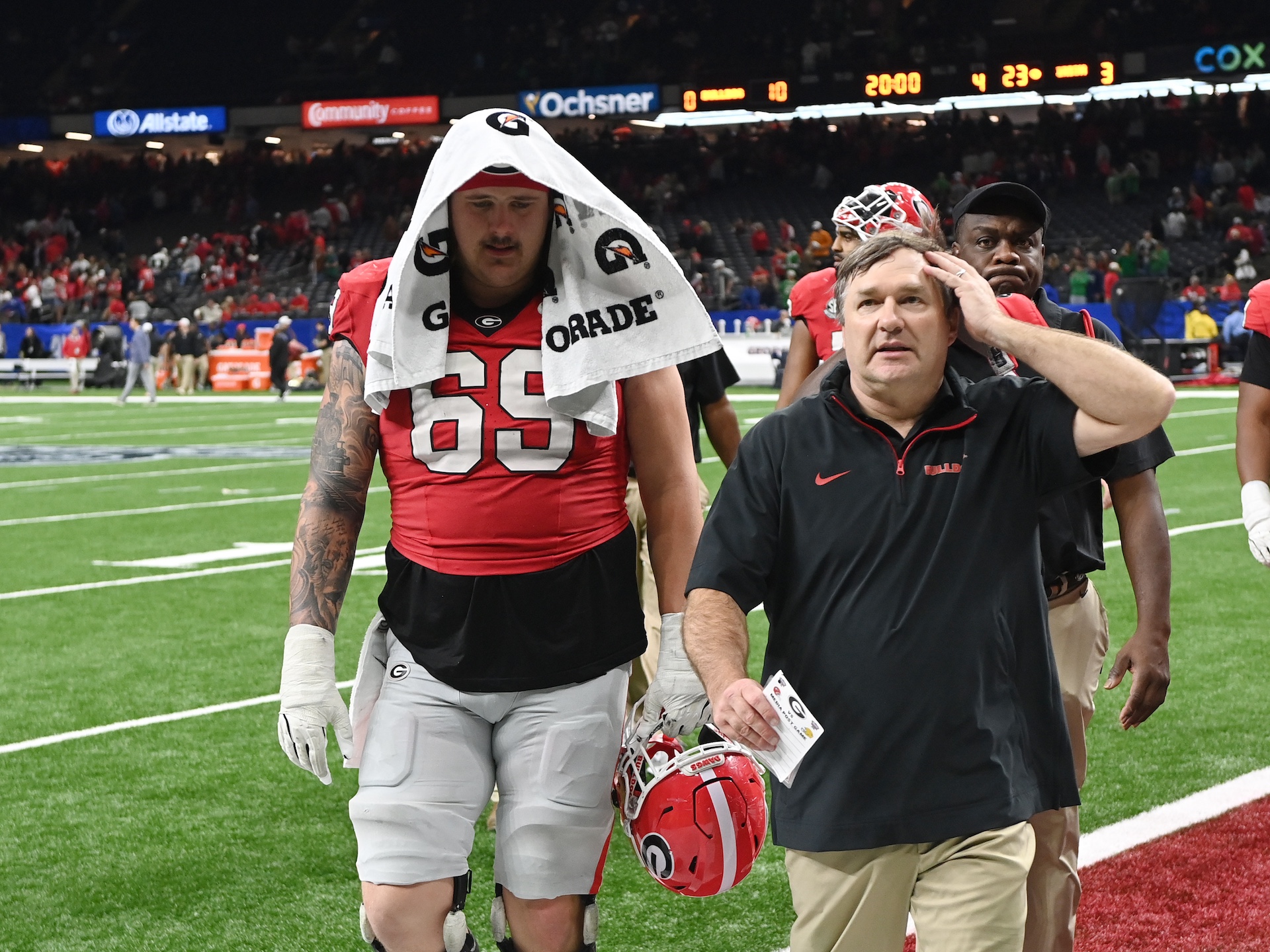There is an explanation for what is happening in baseball, but it does not really explain the best and most confounding stuff. What can be explained concretely is prosaic and small in the shadow of what's more interesting, and while that is generally true about everything, it can feel insufficient. The explicable stuff floats, and so offers something to hold onto, but the rest of it is a current that pulls everything insistently further out to sea. This is a strange position to be in. It means knowing, for instance, the actual answer to why Brandon Marsh always looks like he was just pushed off an airboat—the short answer is that he is a baseball player from Georgia; the longer one is that it's a loving tribute to/taunt of his late father, who got a haircut every week—while not really being able to explain or justify how or why it had to be Marsh that hit the three-run homer on Saturday that effectively finished off the defending-champion Atlanta Braves in the National League Divisional Series.
The first and more knowable part is just the goofballs that make the games happen doing what they do; the bigger forces that govern baseball, which cruelly or not tend to spend the last month of the season pranking and undermining everything that the first 162 games prove out, are also just what they have always been. Because they are abstract, and rude, and have in the past proven disconcertingly inclined to favor the St. Louis Cardinals, these forces are easy to get upset about. But the measure of randomness built into the game—the dumb shit, the weird hops and hot streaks and fluke caroms and other unknown-unknowns—that pulls things apart every October isn't something that can be argued with or somehow legislated away.
It has its own gravity, and the games can seem to reshape themselves around it—Brandon Marsh, looking back, could not have been any less obscure or even less wet, just as the strange magic currently pushing the simultaneously ultra-flawed and utterly invincible Phillies forward into the NLCS would and maybe could only have picked the hitter in the nine-hole to deal the decisive blow.
MARSH MASH 💥 3-run homer for Brandon Marsh!
— FOX Sports: MLB (@MLBONFOX) October 15, 2022
📺: FS1 and the FOX Sports App pic.twitter.com/SvIXszQ5zS
Only Oscar Gonzalez—a 24-year-old rookie who was so marginal a prospect that his name hasn't so much as appeared in a Baseball Prospectus Annual, a book that is the size of a SAT prep manual and exists at least in part to have a lot of baseball guys' names in it, since 2018—could have delivered the game-winning hit that pushed the Yankees to the brink of elimination on Saturday night.
CHAOS. IN. CLEVELAND.
— MLB Network (@MLBNetwork) October 16, 2022
The @CleGuardians are one win away from the ALCS.
📽️ NTT #BallparkCam | #ForTheLand pic.twitter.com/OL8D1Lcvye
The sense of some thread of intent running through all this is an illusion, too, to be clear. No one really knows what is happening, let alone what is going to happen, and no one ever really will until after it's all done, if even then. But the idea that some vague and unreasonable thing is in charge and that every team is simply dealing with that is inarguably closer to the reality of the situation than the unstated position of the (many) people currently complaining about how unfair the MLB Playoffs are, which is that there some nudges or tweaks that could be made to somehow make baseball less like this.
Major League Baseball, which loves to nudge and tweak and tends to operate from the position that there is something bad and broken about baseball that can only be fixed by one gray wave of consultants and lawyers after another, tends to invite this criticism. It is also true that the complaints, which have come not just from anonymous aggrieved fans but cultural semi-eminences like Keith Olbermann ("crowns the champs of a month, not a year") and (oddly) Joe Scarborough ("far too random"), might have something to do with the teams currently on the wrong end of all this randomness. That October is always kind of like this, and will always be like this, does not explain how or why three of the four MLB teams to win more than 100 games during the regular season are already out of the postseason. Or it does, but not in a way that would be likely to satisfy someone who wanted to see the Most Deserving Teams move through the postseason in an orderly fashion.
Which, again, they haven't. The Dodgers won 111 games and were notably better than any other team in the sport, and played just four postseason games. The Braves won 101 and played four; the Mets won 101 and played just three, in the plussed-up Wild Card round. (The Astros won 106, swept the Mariners to advance to the ALCS, and remain the Astros.) It also does not explain how or why the Yankees, who won 99 games and were the best team in the sport for half the year, find themselves needing to win two straight to avoid being eliminated by the damn Guardians. In both the literal and the figurative sense, one of the Phillies and the Padres is going to play in the World Series. This is all really happening, somehow.
You can see why figures like Olbermann and Scarborough, whose jobs are respectively thundering and mewling about towering problems they have no idea how to fix, would feel moved to do their respective things in response to this, and why they might take it as a nearly personal affront. If you understand merit primarily as the force that elevated me to my current position, then it would be confusing to see things shaking out so strangely. More than that, this complaint seems at some fundamental level like a category error. The regular season is the orderly part, October is the opposite; both are important, and the story of the season would not be complete without either. That so much about baseball can be quantified, and that so much of the way that people understand baseball is grounded in that quantification, does not mean that it has in any meaningful way been solved; simply because the available information suggests that something will happen does not mean that it somehow should. That, as the man said, is vanity. It also feels like missing the point.
It is true that players want to win championships, and it is also true that sports media, built as it is around cosplay and play-fights and the comparative furnishing of various boring pantheons, would tend to privilege championships over anything and everything else. It does not follow that someone who is watching this stuff because they enjoy it needs to defer to any of that. Not just because a big part of the fun is watching things work out in a way other than how they are supposed to work out, but because trying to impose order on all this—to make the postseason match or just respect the more representative and (relatively) more reasonable outcomes of the regular season—is doomed. If the structure of the postseason has delivered some outcomes that land somewhere between stupid and cruel, it seems more true to say that this reflects something inherent in the postseason than it does something defective in the design of the best-of-three Wild Card series and the best-of-five Divisional Series. Also, again, the Astros don't seem to have had much problem with it.
That this is unsatisfying, and that fans of the biggest and best teams in the sport have been left dissatisfied by it, does not mean that it can be fixed. The baseball season is long, and teams ride various currents for various reasons while the season grinds them down; what is left, by the end, is and must be different. The teams that play in October are not the same as the ones that played in June, or August, or even September; they are worn out or weirdly enlivened, they have figured things out or forgotten them, and they are subject to the same randomness that pushed them down or lifted them up during the months that led up to this. They are just all closer to the end.
Baseball tends more determinedly towards the implausible as it is put under pressure. The amount of chaos in baseball is constant, and non-negotiable; if we understand that as the part of the sport that is random, and janky, and ungovernable, then it is fair to say that this part of the game is the life in it. This part of it, the dark matter, reacts strangely when compressed. That is more or less how things have wound up where they are, nearly halfway through a postseason that has not gone as expected while also going in the only way it could possibly have gone. It would be easy to forgive a fan of one of the teams that have found themselves on the wrong side of all this, especially after spending the entire regular season decisively proving that they were better than the teams that have dispatched them, for finding this explanation insufficient, or infuriating. It absolutely is, and it absolutely is. But also this is how and what baseball is. There's no mastering it. The only thing to do is chase it.





